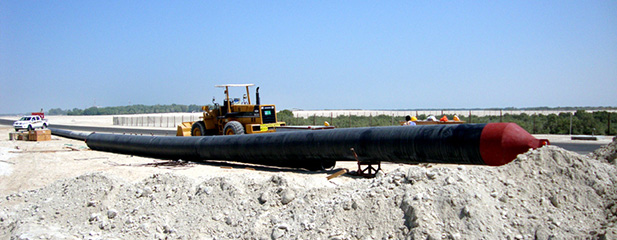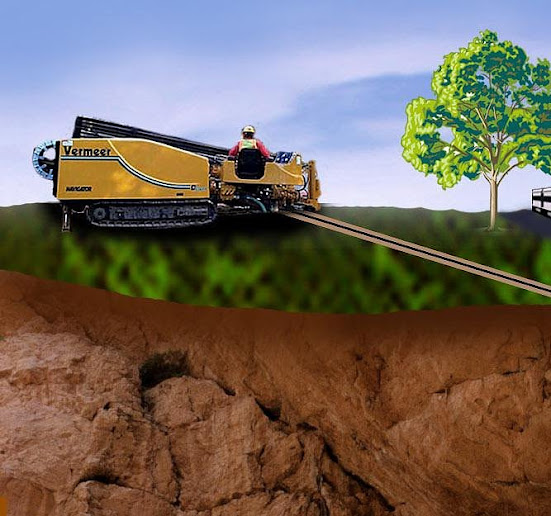Horizontal and horizontal drilling techniques
Chapter
I: Horizontal drilling
The plan of construction
of horizontal drilling technology (HDD) and drawing HDPE pipes applies to the following
jobs:
I.
PRIMARY SURVEILLANCE, SOLUTION, AND CONSTRUCTION RATIO.
I.1.
Collection survey, calculation solution.
The head private links
with main permissions, get the table of the interface in the public;
In the face of the
expected construction, the company's supervising personnel conduct an accurate
verification on the horizontal drilling construction location described in the
profile design, welding power source, clean water combined with drilling fluid.
, safe location to gather construction waste (residual sludge), the server will
handle it according to the regulations on the environment, hygiene and safety,...
Construction team,
Mathematics surveying on the special ground, becoming owners (trees, houses,
lines, underground cables, sewer pipes, embankments, ...), locating drilling
machines, welding HDPE pipes combination, standard pipe layouts, combined
equipment path construction options, materials, possible obstacles, and
solutions to speed up progress.
Derived from natural
conditions: face by, traffic, weather. To overcome these difficulties and speed
up the progress, the horizontal drilling companies must follow the following
criteria:
1. Optimize mobilization
sources for every paragraph.
2. Resources are arranged
for the smooth coordination between schools with school and construction tools,
with the main authorities, local people, functional agencies, and the Investor
to not interrupt the construction process.
3. Strictly check, find
out potential risks, focus on immediate treatment to prevent potential problems
from developing into problems.
I.2.
Construction plan.
The construction plan is
to streamline the following tasks:
1. Site conversion tool,
construction of transport machines at construction sites by the server, HDPE
plastic pipes transported to the site.
2. Career guidance.
3. Scientific work.
4. Connecting the machine
and pulling the HDPE pipes, connecting.
5. Disconnect the device,
tidy up the computer.
II.
DRILLING METHODS
II.1
Drilling in horizontal orientation (pilot bore)
Guide control is based on
the asymmetric mechanism of the drill attached to the drill head.
Drill with a maximum
slope angle of 30%, to design depth then turn to 0%. At the changing position,
bring the drill bit to an angle of no more than 30% to bring it to the
destination.
Based on the blueprint,
use the TriHawk drill bit to drill at a suitable inclination angle. When the
drill head reaches the design direction change point, adjust the tip of the
drill to a "12 clock" angle and then use the thrust to gradually
change the direction of the drill to the horizontal with the predetermined
depth according to the design.
Then continue the
traverse using a rotating technique - pushing the drill head until the trip
point is upwards. Continue to adjust the tip of the drill head to the "12
clocks" angle and use the drill head thrust to advance towards the pre-set
target point. During the drilling process, the drilling fluid is pumped down to
lubricate and reinforce the borehole wall.
Direction control is
controlled based on the asymmetric mechanism of the drill bit mounted on the
drill head.
The whole signal serving
the direction of the drill head is determined by the transmitter inside the
drill head, this transmitter must be continuously active during the drilling
and ensure to send the signal. at least 15m away from the water surface.
This information is
transmitted by the detector via radio waves to the remote display device
located on the drill to help the operator orient the drill according to the
design.
Directional drill bits
must be strictly controlled to follow a predetermined direction by design and
must strictly comply with permissible curvature.
II.2.
Back reaming:
1.
Drilling line expansion technique.
After the directional
drilling is completed, the TriHawk drill head and the drill bit will be
replaced with a reamer. Applying the rotation-pulling technique to bring the
lagoon back to the drilling machine at a suitable speed with the geological
strata of the tunnel passing along with a suitable amount of drilling fluid to
be pumped in to create the tunnel. , for tube pull.
The break-in headworks to expand the drill line into a tunnel of sufficient size to successfully pull the pipeline (at least equal to 120% of the pipe diameter to be pulled).






Nhận xét
Đăng nhận xét